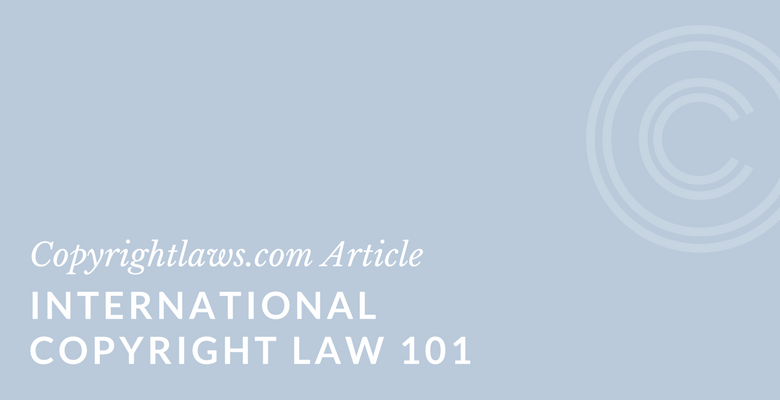
International copyright law doesn't exist! Each country has its own domestic copyright laws that apply to its own citizens, and also to the use of foreign content when used in one's country. It allows creators and content owners around the world and citizens of many countries to enjoy copyright protection in countries other than their own. Read below for practical tips on addressing international copyright issues that you face.
Do You Have an International Copyright Issue?
Many copyright issues that appear to be national copyright issues are in fact international copyright issues. Understanding your own country’s copyright laws is most important, but understanding how copyright treaties and international copyright law works is also essential when publishing content or using content online.
Copyright is one of the areas of intellectual property, which also includes trademarks and patents.
When Does an International Copyright Issue Arise?
With the internet and the way we use, share and publish content in our digital environment, many issues that were once domestic copyright issues have become international copyright issues. A global copyright issue arises in a variety of situations. You have to think globally if any of the following examples apply to you:
- An employee accesses your licensed databases while traveling out of the country
- You’re negotiating a digital license with a vendor/publisher/content owner who's based outside your own country
- Librarians from more than one country (e.g., South Africa, Australia, Canada and the U.S.) join a journal club and share articles through the club (a journal club involves posting articles to a private online space)
- Two colleagues share research papers by authors from several countries via Sharepoint
- You post content on a website or intranet that will be accessed outside your own country
- You post a photograph on your Facebook page and someone accesses that photograph from another country
- Your organization has locations or employees in more than one country
- You’re teaching an online course with students located in more than one country
- You're using content from outside your own country
Handling an International Copyright Issue
If any of the above scenarios apply to you, you need to start thinking about global copyright implications in the planning stages of these activities and prior to using the affected content. As part of your international copyright law education, we set out information below describing the structure of global copyright law. We also provide tips on managing global copyright issues and answer your international copyright questions.
International Copyright Law and the Berne Copyright Treaty
Copyright literally translates to “right to copy.” But it’s not as simple as that (is copyright ever that simple?). This article sets out international copyright law basics in a general and broad manner. Refer to the copyright laws in your country to obtain specific information on what rights and privileges exist in your domestic copyright laws.
If your country is a member of the Berne Copyright Convention, then you'll likely have at least the minimum protection set out in Berne and any exceptions to copyright law will be subject to the "exceptions test" in Berne.
The Berne Convention is the leading international copyright treaty, administered by the World Intellectual Property Organization (WIPO). It has close to 200 member countries. You can see the list of Berne members here.
National Treatment
Each Berne member country automatically provides citizens from other member countries with, at a minimum, the same copyright protections it provides for its own citizens. This is the notion of national treatment.
For example, when you photocopy an article in Australia, you apply Australian law — even if that article originates from an American or British author/copyright owner. Similarly, if you show a French film in public in a U.S. theatre, you apply U.S. copyright law with respect to the right to perform a work in public.
Automatic Copyright Protection
In Berne member countries around the world, copyright protection is automatic upon the creation of a work in a fixed form (i.e., once the work is in some sort of tangible form). This means that no registration or deposit with a government copyright office is required in order to have copyright protection.
There are, however, voluntary government registration systems where copyright owners can register their works, thereby gaining entitlement to certain benefits, especially in cases of copyright infringement of their works.
Similarly, the use of the copyright symbol isn't mandatory under the Berne Convention and by extension in its member countries. However, using the symbol — © — is always a good reminder to the public that copyright exists in a work.
Copyright Duration
The duration of copyright is determined by the copyright statute in each country. In the U.S., Canada and in European Union (EU) countries, it's life-plus-seventy. Specific works and circumstances may result in deviations from these general rules of copyright duration.
Once copyright in a work has expired, that work is said to be in the public domain and anyone may freely use, adapt and reproduce that work.
Each Country Is Unique
Common rights found in copyright acts around the world include:
- Reproduction
- Adaptation and translation
- Performance in public
- Display or communication to the public
Moral rights, which protect the reputation of an author or creator, are very basic in some countries and provide very strong protection in others. The moral right of attribution allows an author to use their name on their work or to remain anonymous, and the moral right of integrity prevents modifications to a work that may prejudice the reputation of the creator.
Managing International Copyright Issues
The internet makes every copyright issue an international copyright issue. Copyright-protected content on the internet can be accessed, used and shared internationally. Therefore librarians and others need to be familiar with international copyright law in addition to domestic law.
How do you begin to grapple with international copyright issues? Below are our tips.
- Know as much as possible about domestic copyright law, which likely still governs the majority of your copyright use issues.
- Be aware that copyright laws vary from country to country. Differences may include the duration of copyright protection or how fair use or fair dealing work.
- Understand that there’s no such thing as a single international copyright law. However, there are copyright treaties and the leading one is the Berne Convention.
- Stay attuned to changes in copyright law at the domestic and international level. To the extent possible, follow the interesting copyright discussions that regularly occur at the international level through the auspices of WIPO. Keep up to date on copyright news and information.
Q&A: International Copyright Law
If you deal with global copyright issues (for example, by using online content), this Q&A provides clear answers to some commonly asked international copyright questions.
Please do not rely on our short practical answers as legal advice or opinions. Contact an attorney should you require legal advice or opinion on international copyright issues.
What's the leading international copyright treaty?
It's the Berne Convention for the Protection of Literary and Artistic Works (Berne Convention or Berne), as discussed above.
What's the role of the WIPO treaties on copyright law and how do they govern copyright in each country?
WIPO administers a number of copyright treaties; however, these treaties don't govern the copyright law in any country. Rather, the countries that adhere to the treaties must include the WIPO minimum standard of copyright protection in their own copyright legislation.
For instance, the Berne Convention specifies 50 years after an author’s death as the minimum duration of copyright protection. Each Berne member country must protect copyright works for at least life-plus-fifty years, but may do so for longer, as does the U.S. which has a copyright duration of life-plus-seventy years.
Do I need to register copyright in each country where I want to claim copyright protection?
No. If a work is protected by copyright in your own country (assuming your country is a signatory to the Berne Convention), then the work is protected in all Berne member countries. No additional steps, including registration or using the international copyright symbol, are necessary to obtain protection. Note that the Berne Convention prohibits mandatory copyright registration with a national copyright office in member countries.
What is the Marrakesh Treaty and does it provide exceptions for certain user groups?
Read our full article on the Marrakesh Treaty.
What is the Beijing Treaty on Audiovisual Performances?
Read our full article on the Beijing Treaty.
Learn more about international copyright law in our
Copyright Leadership Certificate program.



